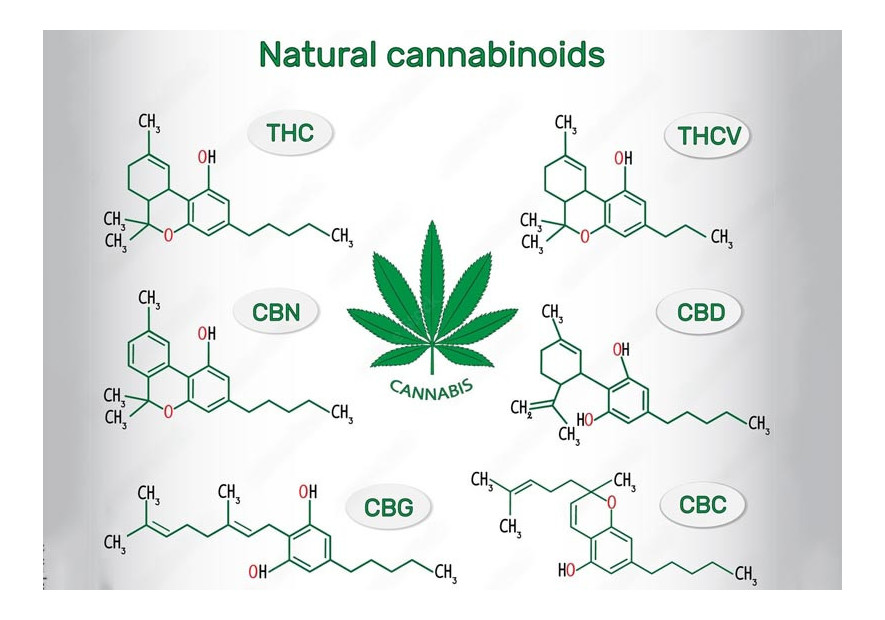CBD, CBG and CBN

Key things to remember:
Cannabinoids have clear benefits for the body. Some of them are even favored for relieving specific ailments. What's more, they can be combined for a double benefit. But before we go any further, it's important to understand the concepts of CBD, CBG and CBN.
What is CBD?
Short for cannabidiol, CBD is the second cannabinoid isolated and studied after THC, a substance harmful to the body. Like THC, it is an active ingredient found in the hemp plant. Yet, CBD does not cause addiction or psychoactive effects. By consuming CBD products, you will not experience the euphoria or the effects or properties associated with THC or cannabis consumption in general. In its natural state, this molecule is present in large quantities in cannabis plants. In addition, cannabidiol is colloquially referred to as a modified molecule extracted from the hemp plant. In its purest form, it is present in crystalline form.
Potential of CBD
Cannabidiol is by far the most well-known cannabinoid. And for good reason, it is said to have countless benefits for the body. While CBD impacts stress through a calming effect, the molecule also has analgesic and anti-inflammatory effects. Studies also suggest that CBD is also a very powerful immunomodulator and may be effective in suppressing cancerous tumors.
A scientific study conducted in 2020 concluded that CBD could be a potential treatment option for many neurodegenerative diseases. Also keep in mind that cannabinoids are not a replacement for medication. They're just interesting therapeutic allies for relieving certain ailments.
CBD, or cannabidiol, is a cannabinoid found in cannabis that has been widely studied for its potential health effects. While studies on CBD are still in the early stages of development, there is already plenty of evidence to suggest that CBD may have many health benefits. Some of the potential benefits of CBD include:
Pain and inflammation relief:
CBD has been shown to have analgesic and anti-inflammatory effects and is often used to relieve pain and inflammation.
Treatment of anxiety and depression:
CBD has been shown to be effective in treating anxiety and depression.
Epilepsy treatment:
CBD has been approved by the FDA in the U.S. for the treatment of epilepsy, particularly in children with severe epileptic syndromes.
Improved heart health:
Some studies suggest that CBD may have beneficial effects on heart health, such as reducing blood pressure and preventing heart attacks.
It should be noted that most of these potential benefits of CBD have been demonstrated in preclinical studies or in small groups of people, and that further research is needed to confirm these findings and evaluate the effectiveness of CBD in treating these conditions.
What is CBG?
First of all, it is important to understand the origin of CBG. Indeed, cannabis is the product of several types of molecules, with an average of 100 cannabinoids. But generally, when we talk about cannabinoids, we only think of CBD and THC.
CBG is also a molecule found in hemp. Also known as cannabigerol, it is an inactive cannabinoid extracted from the cannabis plant. However, CBG levels vary between strains of the cannabis plant. Generally, we find low levels of CBD in cannabis plants. This is also what makes it more difficult to harness.
Today, CBG is considered a precursor to other cannabinoids. Although it may seem insignificant at first glance, it is now involved in the formation of CBD, THC and several other compounds. This also explains why it is present in different concentrations in most hemp strains.
Benefits of CBG
CBG, or cannabigerol, is a cannabinoid found in cannabis. It is a "precursor" cannabinoid, meaning that it is converted into other cannabinoids, such as CBD and THC, during the maturation process of cannabis.
CBG has been studied for its potential health effects and has been shown to have several potential benefits.
Some of the potential benefits of CBG include:
Pain and inflammation relief:
Some research indicates that CBG may have analgesic and anti-inflammatory effects.
Improved intraocular pressure: CBG has been shown to improve intraocular pressure in people with glaucoma.
Antimicrobial effects: CBG has been shown to have antimicrobial effects and to be effective against drug-resistant bacteria.
Neuroprotective effects: Some research suggests that CBG may have neuroprotective effects and may be beneficial for people with neurodegenerative diseases such as Alzheimer's.
It should be noted that most of these potential benefits of CBG have been demonstrated in preclinical animal or in vitro studies and that further research is needed to confirm these findings in humans.
Cannabigerol is a non-psychoactive substance. This molecule has antifungal properties. But that's not all. CBG is also effective in fighting against oxidative stress within the cells thanks to its antioxidant properties.
In addition, studies have also confirmed that CBG has the following properties:
- Appetite stimulant
- Anti-cancer properties proven in studies on melanoma or colon cancer
- Vasodilator, very useful in glaucoma
- Calming anxiety and depression
CBD (cannabidiol) and CBG (cannabigerol) are both cannabinoids found in cannabis. They are both considered non-psychoactive cannabinoids, which means they do not produce a "high" or stoned feeling when consumed.
However, there are a few key differences between CBD and CBG. First of all, CBD is much more common in cannabis and is generally produced in larger quantities than CBG. CBG, on the other hand, is considered a "precursor" cannabinoid and is often converted to CBD or THC during the cannabis maturation process.
In terms of health benefits, CBD and CBG have similar effects, but CBG has also been shown to have antimicrobial effects and to improve intraocular pressure in people with glaucoma. Both CBD and CBG are used to treat anxiety, depression and other mental health disorders, as well as to relieve pain and inflammation.
What is CBN?
CBN, or cannabinol, is a cannabinoid found in cannabis. It is a breakdown product of THC and is formed when THC is exposed to light and air. CBN has psychoactive effects, but they are less potent than those of THC. It also has sedative properties and can be used to help treat insomnia.
CBN has also been studied for its potential effects on pain and inflammation. Some research indicates that CBN may have analgesic and anti-inflammatory effects, although these effects have not been studied as intensively as CBD or THC. As with any other cannabinoid, it's important to talk to a doctor before taking CBN or any other cannabis-based supplement.
As the name suggests, cannabidiol is derived from cannabis, also known as Indian hemp. Joins a long list of well-known cannabinoids.
CBD, THC, CBG from the hemp plant. But unlike our competitors, CBN is the result of a different process.
Originally, it exists as an acid (CBNa) in plants. It is a molecule closely related to THC and cannot be produced without THC. In fact, CBN is obtained by heating and oxygenating THC. In other words, it is the decarboxylation caused by heat and oxygen that gives CBN its final form. CBN is thus a molecule derived from the cannabis plant, more precisely from THC.
Benefits of CBN
Cannabidiol relieves pain, stimulates appetite and fights muscle spasms. Its primary use is to promote sleep. In fact, CBN has a reputation as the cannabinoid of sleep. It has also been shown to harmonize the night cycle and combat insomnia.
In addition, studies have confirmed that CBG has other properties. These are:
- Fighting asthma
- Relief from neurodegenerative diseases
- Relief from psoriasis
- Difference between CBD and CBG
- CBG and CBD are both cannabinoids. Despite their many similarities, these two cannabinoids differ from each other in several ways.
Pharmacology
As mentioned above, CBD and CBG activate receptors in different ways. Based on the results of recent studies on the effects of CBD and CBG on serotonin receptors, cannabidiol appears to exert its anti-nausea properties via its affinity for receptors acting as activators.
CBD, on the other hand, acts as a blocker or antagonist. The results even confirmed that CBG blocked the antiemetic effects of cannabidiol. This indicates that the two compounds bind to the same binding site, but have opposite interactions with the receptor.
Appetite stimulation is also an important difference between CBD and CBG. A recent study on rats confirmed that CBG stimulates appetite more than control rats. Another observation also showed that CBG produced no change in eating behavior, but CBD significantly reduced overall food intake. Therefore, CBG claims to stimulate appetite more than CBD.
Difference between CBD and CBN.
While CBD and CBN have many similarities, their differences are just as striking. Let's start with what connects them. They are primarily two non-psychotropic molecules. Both promote restful sleep. In addition, it is beneficial to physical and mental health, promoting physical relaxation and reducing anxiety. Also, their field of action is essentially at the level of cannabinoid receptors. As for their differences, these two substances do not have the same chemical composition nor the same origin. CBN is obtained from cannabis flowers harvested by oxidizing THC. CBD, on the other hand, is the origin of CBDA, and its formation is attributed to an enzymatic reaction in living plants. These plants decarboxylate when exposed to light or intense heat.
CBD, on the other hand, is better understood and analyzed than CBN. Moreover, CBD is uplifting, unlike CBN, which tends to be relaxing.
In terms of their molecular structure, CBN and CBG have different chemical structures. This refers to the number and arrangement of carbon, oxygen and hydrogen atoms that make up the two cannabinoids. In addition, CBG and CBN form 3D patterns with different shapes.
Based on the results of recent studies on the effects of CBN and CBG, CBN seems to have a sedative effect while CBG has natural blockers.
Finally, what is the difference between CBD, CBG and CBN?
The difference between CBG, CBD and CBN lies in the nature of each molecule and its effects. In fact, their effects are slightly different from each other.
Most importantly, CBD acts as an excellent anti-stress agent for chronic stress.
CBG acts primarily as an analgesic and is ideal for chronic pain.
CBN acts as a sedative in nature and is great for insomnia.
Benefit from the entourage effect
Since cannabinoids offer a variety of benefits, it's best to choose a product that contains multiple ingredients for different effects. In addition, associations between hemp-derived molecules are not uncommon. It is best to use the entourage effect.
The entourage effect is transmitted to the body through several synergistic ingredients in hemp. Therefore, special attention must be paid to the characteristics of both full spectrum and broad spectrum products in order to take advantage of this benefit. However, please note that full-spectrum products contain the legal 0.3% THC, unlike broad-spectrum products.
Can CBG and CBD be used together?
While there are many studies showing the benefits of taking a single cannabinoid, combining multiple cannabinoids offers even more benefits, due to the entourage effect.
The combination of CBD and CBG allows the specific effects of each cannabinoid to have full results on the body.Therefore, by using cannabigerol and cannabidiol products, consumers are more likely to experience more effective effects.Can create a chemical balance to get While CBG acts directly on receptors, CBD stimulates enzymes that produce natural endocannabinoids in the body. Additionally, many people report that taking CBG alone makes them feel drowsy, while CBD alone gives them energy.
The process of taking CBG + CBN oil is similar to taking CBD oil. Also, there is no set dose that is perfect for everyone. Everyone's body reacts differently. Therefore, a dose that works for one person may not be as effective for another.









Leave a Comment